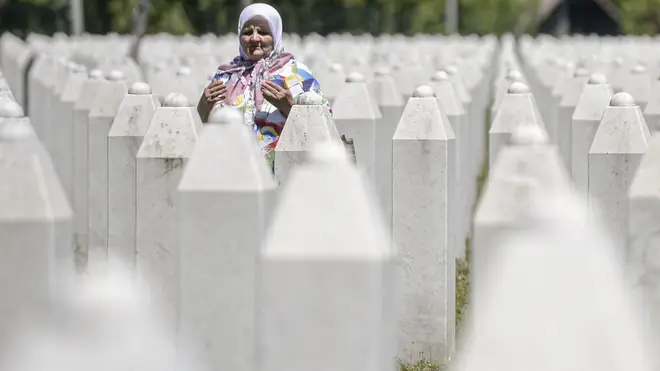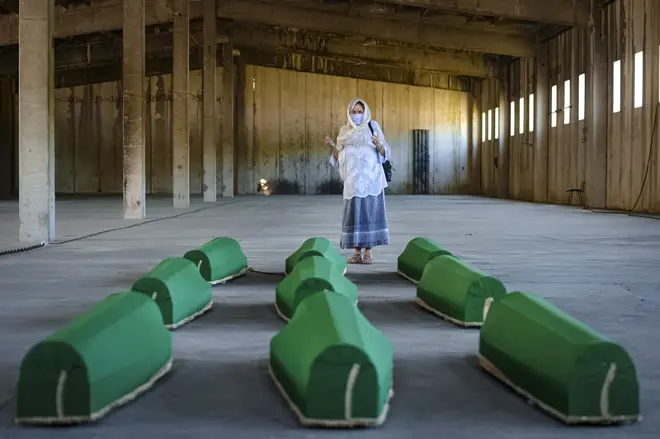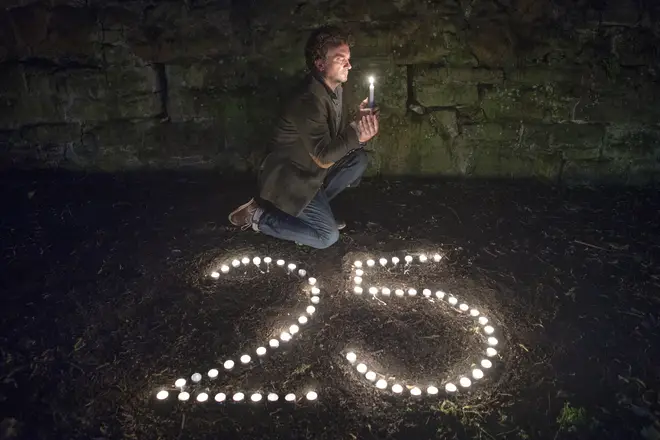
Rachel Johnson 7pm - 10pm
11 July 2020, 16:16

World leaders have joined survivors of the 1995 Srebrenica massacre to remember the victims of the only crime in Europe since the Second World War that has been declared a genocide.
Most international speakers urged tolerance and reconciliation in Bosnia, still ethnically divided 25 years since the brutal execution in July 1995 of more than 8,000 Bosniak Muslim men and boys.
But the Bosniak Muslim member of the country's tripartite presidency, Sefik Dzaferovic - one of few officials attending in person - went further, urging the world to demand Serb leaders finally accept responsibility and open the way for true reconciliation.
"I am calling on our friends from around the world to show not just with words but also with actions that they will not accept the denial of genocide and celebration of its perpetrators," he said.
"The Srebrenica genocide is being denied (by Serb leaders) just as systematically and meticulously as it was executed in 1995... we owe it not just to Srebrenica, but to humanity, to oppose that," he added.
On Saturday, the recently identified remains of nine victims were reburied in a memorial cemetery just outside the town in eastern Bosnia.

The Srebrenica massacre is the only episode of Bosnia's 1992-95 war to be defined as genocide, including by two UN courts. But leaders in neighbouring Serbia still deny the extent of the 1995 massacre and refuse to acknowledge it amounted to a genocide.
After murdering thousands of Srebrenica's Muslims, in an attempt to hide the crime, Serbs dumped their bodies in numerous mass graves scattered throughout eastern Bosnia.
Body parts are still being found in mass graves and are being identified through DNA analysis.
Close to 7,000 of those killed have already been found and identified. Newly identified victims are buried each year on July 11 - the anniversary of the day the killing began in 1995 - in the memorial cemetery.
Dozens of world leaders, including Canadian prime minister Justin Trudeau and Spain's
Pedro Sanchez, US secretary of state Mike Pompeo and the Prince of Wales, addressed the commemoration ceremony via prerecorded video messages.

Typically, thousands of visitors attend the commemoration service and funeral, but this year only a relatively small number of survivors were allowed at the cemetery due to the coronavirus pandemic.
Bosnian Serb wartime political leader, Radovan Karadzic, and his military commander, Ratko Mladic, were both convicted of and sentenced for genocide in Srebrenica by a special UN war crimes tribunal in The Hague.
In all, the tribunal and courts in the Balkans have sentenced close to 50 Bosnian Serbs wartime officials to more than 700 years in prison for Srebrenica killings.
Bosnian Serbs, however, still celebrate Karadzic and Mladic as heroes. Some are even staging celebrations of "the 1995 liberation of Srebrenica" on the anniversary of the crime.
Judge Carmel Agius, president of the UN court that is currently completing war crimes trials stemming from the break-up of Yugoslavia, warned in his video message that the victims of the Srebrenica massacre "continue to be tormented by those who attempt to deny their lived experiences, and, thereby, their very existence".
Judge Agius voiced hope that the new generations in the Balkans will reject the narratives of their political leaders and "champion the truth and justice in honour of the victims we are commemorating today".
The Bosnian war pitted the country's three main ethnic factions - Serbs, Croats and Bosnian Muslims - against each other after the break-up of Yugoslavia.
More than 100,000 people were killed in the conflict. When the war ended in a US-brokered peace deal in 1995, a Serb-run entity was formed within Bosnia, of which Srebrenica became part.